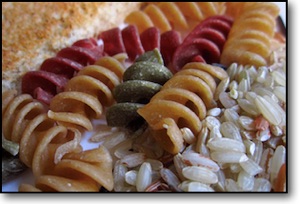

Article

Sugars, starches, and tears – oh my!
Why the tears?
Because not “doing” sugars and starches properly can lead to unhappy issues like:
-
•cravings for sugars and starches
-
•chronic low energy and fatigue
-
•depression and anxiety
-
•weight gain and obesity
-
•poor sleep
Long-term consequences can include:
-
•diabetes
-
•poor immunity, allergies, and autoimmune disorders
-
•atherosclerosis and high blood pressure
-
•allergies and other immune problems
-
•sleep apnea
For women...
-
•PMS
-
•polycystic ovary syndrome
And for men...
-
•male-pattern baldness
-
•enlarged male breasts and prostate issues
The problem with sugars and starches...
Problems tied to sugars and starches can be classified like this...
1. Too much fuel
-
•eating lots of sugar and starches equates to intaking too much fuel
-
•fuel that cannot be burned immediately will be stored – mostly as fat
-
•excess fat can contribute to weight gain and cardiovascular disease
-
•excess glucose can damage the body by sticking to things it shouldn't and interfering with how they work e.g. enzymes, hemoglobin
-
•high amounts of glucose in the blood can lead to decreased mental function and eye and nerve damage
2. Too much insulin
Insulin is a hormone (messenger) made by the body and released when there are sugars in the blood.
Too much insulin at one time – due to a high sugar or starch meal or snack...
...is associated with:
Hypoglycemia
-
•insulin is released quickly and excessively (refered to as an insulin spike) to put away glucose
-
•blood sugar levels then drop too low
-
•this can lead to fatigue, headaches, anxiety, depression, foggy thinking, and low energy
Too much insulin on an ongoing basis – due to a diet high in sugars and starches...
...is associated with:
Insulin resistance
-
•body cells become insulin resistant (stop "listening" to insulin)
-
•glucose remains in the blood and contributes to many health problems
-
•associated with hypoglycemia and diabetes
Inflammation
-
•insulin is pro-inflammatory in the body
-
•inflammation contributes to joint problems, muscle pain, headaches, and other health issues.
Free radical damage
-
•insulin causes free-radical damage to body cells and tissues
-
•free radical damage is associated with joint problems, chronic pain, and cancer.
Insulin-like growth factor (IGF)
-
•insulin increases the activity of Insulin-like growth factor
-
•IGF stimulates cell growth and proliferation – which can contribute to early aging and cancer
Obesity
-
•insulin "tells" the liver to store glucose and MAKE FAT
-
•insulin "tells" fat cells to STORE FAT
Key message of insulin = STORE food energy
Important note: you can't "unstore" body fat when insulin is present!
Health effects of sugars, starches and insulin
Sugar increases risk of weight gain and Type 2 diabetes
JAMA. 2004 Aug 25;292(8):927-34.
Sugar-sweetened beverages, weight gain, and incidence of type 2 diabetes in young and middle-aged women.
Schulze MB, Manson JE, Ludwig DS, Colditz GA, Stampfer MJ, Willett WC, Hu FB.
http://www.ncbi.nlm.nih.gov/pubmed/15328324
Insulin negatively affects cognitive ability
J Alzheimers Dis. 2010;21(1):57-63.
Is insulin resistant brain state a central feature of the metabolic-cognitive syndrome?
Frisardi V, Solfrizzi V, Capurso C, Imbimbo BP, Vendemiale G, Seripa D, Pilotto A, Panza F.
http://www.ncbi.nlm.nih.gov/pubmed/20421697
Too much insulin increases risk of Alzheimer's disease
Arch Neurol. 2005 Oct;62(10):1539-44.
Hyperinsulinemia provokes synchronous increases in central inflammation and beta-amyloid in normal adults.
Fishel MA, Watson GS, Montine TJ, Wang Q, Green PS, Kulstad JJ, Cook DG, Peskind ER, Baker LD, Goldgaber D, Nie W, Asthana S, Plymate SR, Schwartz MW, Craft S.
http://www.ncbi.nlm.nih.gov/sites/entrez?db=pubmed&uid=16216936&cmd=showdetailview&indexed=google
Insulin increases Insulin-like growth factor – which increases risk of cancer
J Natl Cancer Inst. 2002 Jul 3;94(13):972-80.
Insulin, insulin-like growth factor-I (IGF-I), IGF binding proteins, their biologic interactions, and colorectal cancer.
Sandhu MS, Dunger DB, Giovannucci EL.
http://www.ncbi.nlm.nih.gov/pubmed/12096082
Key recommendations for managing sugar and starches:
1. Sugars
Avoid:
-
•table sugar
-
•refined syrups
-
•high fructose corn syrup
-
•products containing these
Use:
-
•maple syrup and honey – in small amounts
-
•stevia – a sweet herbal product
-
•agave nectar...? – I have seen contradictory evidence about this and personally avoid it. Look for reputable sources.
2. Starches
Because refined starches easily break down to glucose, eating refined starches can be almost as bad for you as eating pure sugar!
LIMIT TOTAL STARCHES PER MEAL to between 3/4 to 1 cup by volume (i.e. NOT much).
Avoid:
-
•white stuff – refined grains
-
•white rice
-
•potatoes, fries
-
•white pasta
-
•breads, pastries, etc.
-
•beans cooked in sugar!
Use:
-
•whole grains – e.g. rice, kamut, spelt, quinoa, millet
-
•starchy vegetables – e.g. sweet potatoes, beets, carrots, squash
-
•all kinds of beans – e.g. chickpeas, kidney beans, lentils, split peas
3. Juices:
Dilute to at least 50:50 with water and limit to 1 cup at a time
4. Protein and fat
Include protein and fat whenever eating sugars and starches – to slow down their rate of digestion and absorption.
5. Non-starchy vegetables
Eat lots of these – broccoli, cauliflower, green leafy vegetables, green beans, raw carrots, tomatoes, cucumbers, radishes, green and yellow beans. These help lower the "sugar hit" from sugars and starches.
AND OF COURSE...
Avoid:
-
•soda pop and colas
-
•"fruit juices" made from sugar
-
•candies, candy bars
-
•other sugar-laden "foods"
Home | Holistic Nutrition | Talks and workshops | Contact | Articles and recipes

© 2020 Paul Demeda | 2869 Bloor Street West | Toronto, ON M8X 1B3, Canada